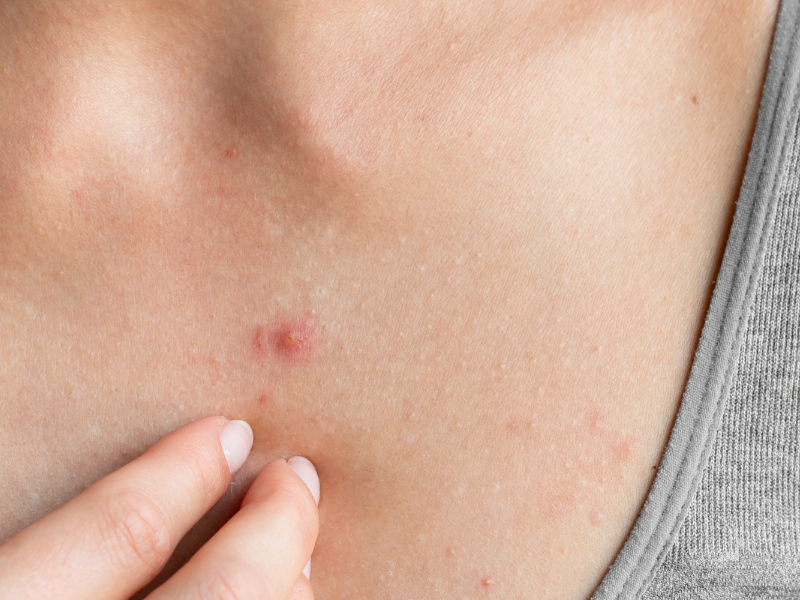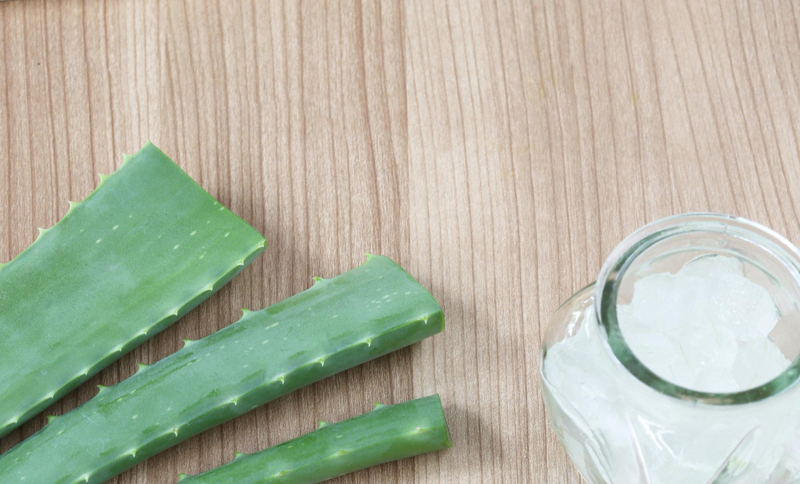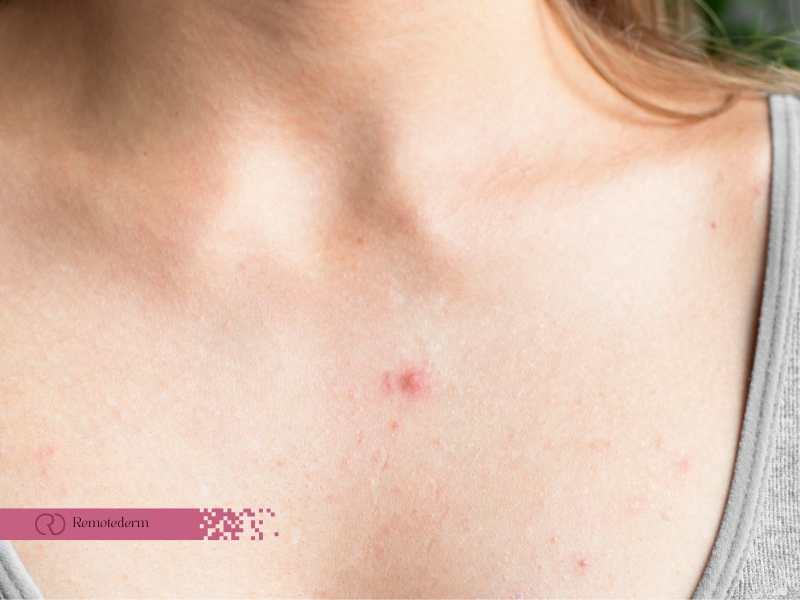Chest acne is aggravating and can make bathing uncomfortable; however, learning what causes it and the options for its treatment will make it possible for you to enjoy healthy skin. In this helpful and thorough guide, we will discuss what causes chest acne, introduce solutions, and explain the tricks to keeping the skin acne-free. Whether you’re in Canada or elsewhere, these solutions are applicable and effective.
What Causes Chest Acne?
Chest acne occurs when hair follicles on your chest become clogged with oil, dead skin cells, and bacteria. Here are some common causes:
- Fluctuations in hormones, especially during puberty, pregnancy, or menstrual cycles, can increase oil production, leading to acne.
- Tight clothing and excessive sweating can trigger agitations and breakouts due to bacteria and sweat that are trapped on the skin.
- Not showering occasionally and neglecting proper cleansing of the chest area.
- Certain foods, particularly the sugary and dairy ones, can increase the chances of acne.
- Increased stress levels may cause hormonal changes that would worsen acne or any other signs of skin health.

How to Get Rid of Chest Acne
Clearing up chest acne demands that the person commit to proper hygiene practices, use some topical treatments, and make the right lifestyle changes.
1. Maintain Good Hygiene
Health and hygiene are very important. By taking a shower often, especially when you have just finished exercising with a lot of strain or at a time when you have been sweating, the skin will cleanse itself of the excessive oil and bacteria. In addition, non-clogging products from drugstores are often more gentle on the skin, making them a better choice compared to other similar products.
2. Topical Treatments
After you wash your chest, you should use a skincare routine treatment made for acne. Benzoyl peroxide or a retinoid (like Differin, which used to be only available with a prescription) can help your skin a lot. Before going to bed, you should put a topical treatment on your chest. If you choose a benzoyl peroxide solution, which will bleach anything it touches, make sure you wear a T-shirt that you don’t mind getting dirty.
3. Wear Breathable Clothing
When you wear clothes that are too tight, dirt, bacteria, and oils can get trapped and turn into spots. Wool, nylon, and spandex are just a few of the fabrics that can make irritation worse. Wearing cotton clothes is the best thing you can do.

4. Dietary Adjustments
The consumption of a different diet that helps you fight your acne would be a great idea to take into account. One way to do this is by reducing your sugar intake. Besides, dairy, if you observe, can become your skin antagonist; therefore, you may want to lessen your consumption. Remember to also drink a lot of water in order to maintain proper levels of skin and overall health.
5. Stress Management
Make physical activity your regular stress control method. One way of achieving this is through regular exercise. Furthermore, use time for yoga and meditation to be mindful in order to counteract the negative effects of stress.
6. Consult a Dermatologist
When over-the-counter treatments do not work, the very first thing you should do is to consult a professional dermatologist. When over-the-counter treatments do not work, the very first thing you should do is to consult a professional dermatologist. They might prescribe stronger medicines or propose ideas for alternative ways to deal with the issue. Here are a few examples:
- Oral antibiotics are able to help eliminate bacteria causing infections and swelling at the same time, so that you can fight off the infection.
- Although there are other drugs that can be used for hormone control, birth control pills are without a doubt the most common ones.
- Online acne dermatology services offered on secure and reputable platforms on the internet are being used in Canada for medical care. Such services provide personal treatment plans, including acne treatment.
Home Remedies for Chest Acne
If you have a preference for natural solutions, here are a few home remedies that could potentially be of assistance:
- Tea tree oil is well known for its antibacterial properties. It is recommended to dilute it with water before applying it to the affected areas.
- Apple cider vinegar holds the incredible power to balance the pH of your skin and eliminate acne.
- Aloe vera has the properties of a soothing agent and a healing master.
- Green tea is good for the skin. You may experiment with cooled green tea bags on the affected areas to help decrease inflammation.

Preventing Chest Acne
Consistency and correct life choices are the two most important factors in the process of getting rid of chest acne. Here are the expert suggestions on the topic:
- After sweating, it’s important to shower to keep your skin fresh and dry.
- Make sure to always wear clean clothes rather than re-wearing ones that are dirty or sweaty.
- Choose non-comedogenic products so your cream or sunscreen won’t clog your pores.
- Choose a balanced diet of fruits, vegetables, and lean proteins for overall health.
Final Thoughts
Managing chest acne takes a combination of good hygiene, topical treatments, and lifestyle changes. Know what causes chest acne; use these tips to get clearer skin. If over-the-counter treatments fail, consider seeing a dermatologist. Even online acne dermatology services in Canada can help.
FAQs
Can chest acne signal an underlying health issue?
Sometimes chest acne sticks around longer than usual; this could mean something more serious, like hormonal imbalances. If your chest acne just won’t go away, seeing a healthcare professional is a good idea.
Are there any specific fabrics to avoid for preventing chest acne?
Avoid synthetic fabrics like polyester. They trap sweat and bacteria. Instead, choose breathable fabrics such as cotton; it’s better for your skin.
Can swimming in a chlorinated pool help with chest acne?
Chlorine can help with acne because it has antibacterial properties; however, it can also dry out your skin. Make sure to moisturize after swimming to prevent irritation.
Is it safe to pop chest acne pimples?
Popping pimples is a bad idea. It can cause scarring and infections. Use proper treatments to reduce acne instead.
